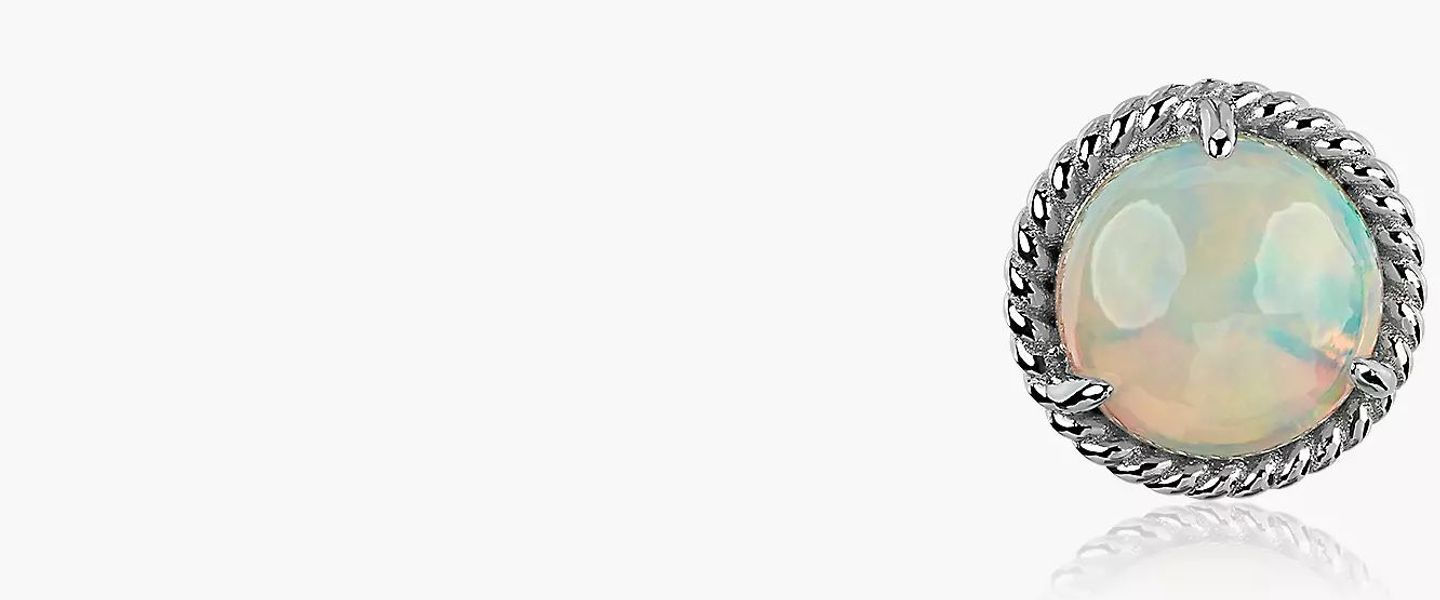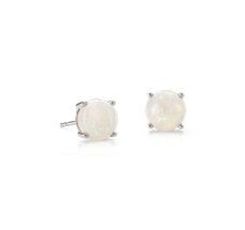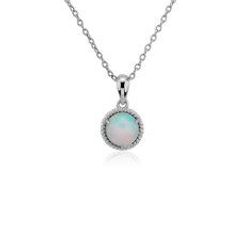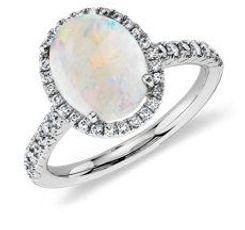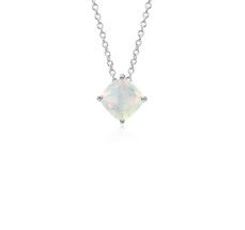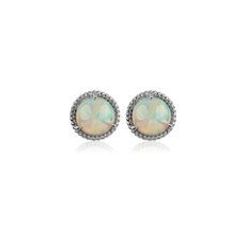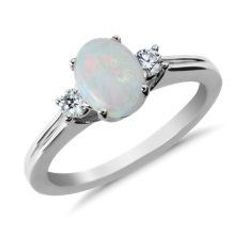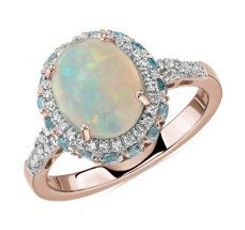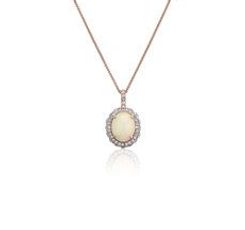What is an opal?
Opals are an amorphous form of silica, meaning they don’t have a crystalline structure like other gems. This distinct formation is found only in opals and creates an optical phenomenon of glittering rainbow prisms called play-of-color. The majority of opals are mined in Australia, but deposits are also found in Brazil, Ethiopia, Mexico and the United States. Opals are the birthstone for the month of October and the gemstone of the zodiac sign Libra.
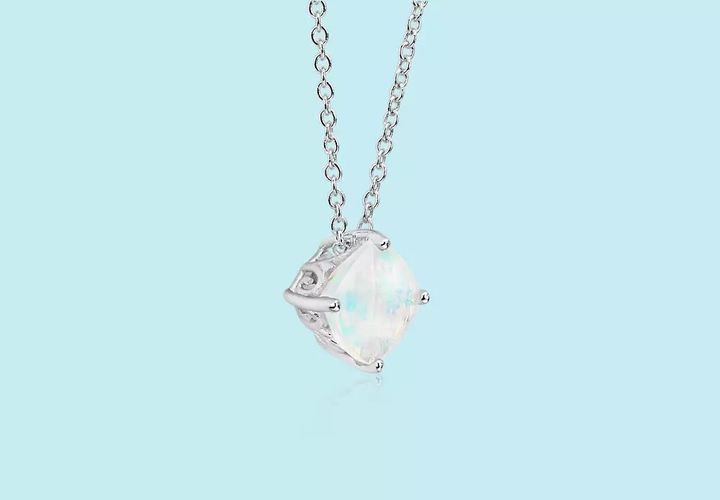
CRPeters, CC BY-SA 3.0, via Wikimedia Commons / Cropped from original
Mineral: Hydrated Silica
Origins: Brazil, Ethiopia, Mexico, United States
Symbols: Truth, Purity
Properties: Freedom
Durability: 5 to 6.5
ENHANCEMENTS
Coated to alter surface consistency and durability
CARE
Special Gemstone Care: Do not use ultrasonic cleaning. Avoid sudden temperature changes, chemicals, perfume, cosmetics, and hairspray.
SIMILAR GEMSTONES
Pearl
Chalcedony
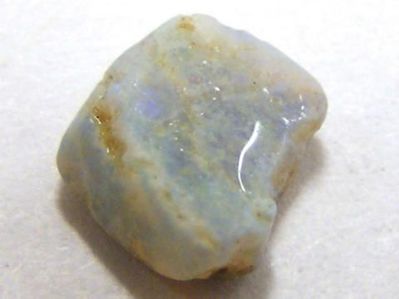
What to Look for in Opals
When choosing an opal, pay attention to its play-of-color, pattern and intensity. Opals come in limitless colors, and no two opals look alike, so enjoy perusing the different varieties—the right one will pop out at you when you see it.
COLOR
Gemstone Color is often the most important factor in determining a gem’s value. Opals may display one or two colors or an entire rainbow. Opals are defined by the background color upon which the magical play-of-color dances. If the body of the opal is transparent, color patches can be seen below the surface. The main types of opals are:
Black Opal: Black opals have a dark body that ranges from translucent to opaque. The contrast of opalescent rainbows shimmering against a dark background makes these gems highly sought after.
White Opal: Sometimes called light opals, these light opals have a white or light grey body with iridescent flashes characteristic of opals.
Crystal Opal: Crystal opals, also called water opals, are colorless and transparent to semi transparent with a rich play of color.
Fire Opal: Also called sun opals, these gems have a yellow, orange or red body, sometimes with a vibrant green to lavender play of color.
Boulder Opal: Boulder opals range from translucent to opaque with a stunning play of color. These opals contain fragments of the surrounding rock in the finished piece.
Look for an opal that has a brilliant luster and a beautiful pattern — also known as the arrangement of the play-of-color. Types of opal patterns include:
Pinpoint: Identifiable by small, closely-set patches of color.
Harlequin: Large, angular patches of color are signatures of harlequin opals.
Flame: Sweeping reddish strokes fly across these gems.
Peacock: Opals with mainly blue and green patches of color.

CUT
The cut of a gemstone is what gives it symmetry and shows off the opal’s play-of-color and brilliance. Because of their amorphous structure, opals are commonly found in domed cabochon cuts, which highlight this gem’s spectral beauty and give opals a sturdiness worthy of engagement rings.

CLARITY
Gemstone clarity is determined by any inclusions embedded in the opal, such as fractures, pits, or other blemishes. An opal’s clarity is rated by its transparency, which ranges from clear to opaque. Different levels of clarity are prized depending on the background color of the opal.

SIZE (CARAT)
While diamonds are valued based on carat weight, gemstone size is based on diameter in millimeters. Opals come in many different sizes, but larger opals tend to carry a higher price tag because they usually—but not always—have better play-of-color.

ENHANCEMENT
Gemstone enhancements are used in most gemstones on the market today to improve the stone’s qualities. Opal enhancements may include an infusion of colorless oil, resin, wax, or other hardener to improve durability and bring out the luscious sheen of the stone. In some cases, opals that are thin or translucent will get a backing of some sort that adds rigidity and — depending on the opal — highlights its spectacular color play.

HARDNESS & WEARABILITY
Opals are a delicate gem with a rating of 5 to 6.5 on the Mohs scale of hardness. This means that while opals make for stunning pieces of fine jewelry, they might not be suitable for everyday wear and require special care to stay in tip-top shape.
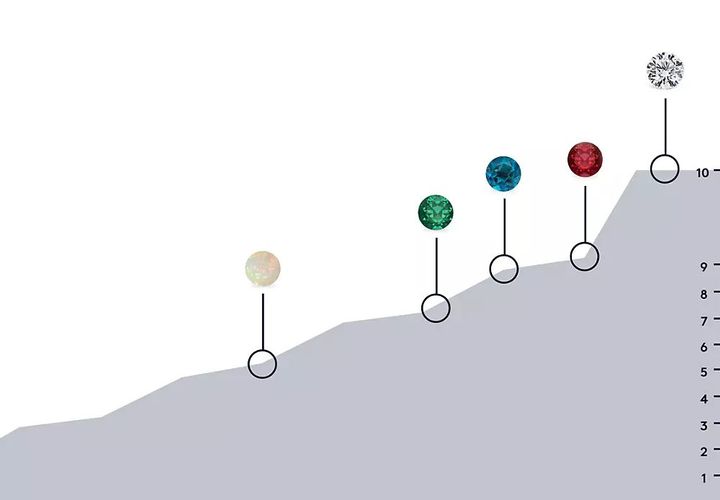
Choosing the Right Opal Jewelry
Opals will dazzle and delight in any metal, from romantic rose gold to imperishable platinum. As a softer gem, opals do well in protective bezel settings, which wrap the gemstone in metal, or in settings with a halo of diamonds or other gemstones that provide additional protection for the opal. Opal engagement rings are vulnerable to scratches and chips and should be worn with the utmost care to prevent these gentle gems from becoming marred.
Shop Popular Opal Jewelry
Famous Opal Gemstones
The ancient opal has long been imbued with magnificent and spellbinding properties. Zeus, King of Gods, was so happy when he defeated the Titans that he wept tears of opals. In the Middle Ages, the opal’s ever-shifting colors gave rise to a belief that they could turn the wearer invisible. The ‘Virgin Rainbow’ opal is one of the rarest opals, famous for its incredible fluorescence that allows it to glow in the dark. Today, opals have adorned the likes of Taylor Swift and Meghan Markel, and the mysterious black opal made an appearance in the blockbuster hit Uncut Gems.
LEARN MORE ABOUT GEMSTONES
Opals are just one of many gemstones you’ll find at Blue Nile. Learn about other gemstones, and fall in love with all of them.
